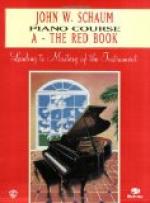“In my own playing, when I color a phrase, I do not work up to a climax and make that the loudest note, as most pianists do, but rather the soft note of the phrase; this applies to lyric playing. I will show you what I mean. Here is a fragment of two measures, containing a soulful melody. I build up the crescendo, as you see, and at the highest point, which you might expect to be the loudest, you find instead that it is soft: the sharpness has been taken out of it, the thing you did not expect has happened; and so there are constant surprises, tonal surprises—tone colors not looked for.
“It is generally thought that a pianist should attend many recitals and study the effects made by other pianists; I, on the contrary, feel I gain more from hearing a great singer. The human voice is the greatest of all instruments, and the player can have no more convincing lesson in tone production and tone coloring, than he can obtain from listening to a great emotional singer. The pianist should hear a great deal of opera, for there he will learn much of color, of effect, light and shade, action and emotion.
WE DO NOT WANT CUT-AND-DRIED PERFORMANCES
“The third requisite for the pianist, as I have said, is true feeling. I have no sympathy with dry, mechanical performance, where every effect is coldly calculated beforehand, and the player always strives to do it the same way. How can he always play the same way when he does not feel the same? If he simply seeks for uniformity where does the inspiration come in?
“The true artist will never give a mechanical performance. At one time he may be in a tender, melting mood; at another in a daring or exalted one. He must be free to play as he feels, and he will be artist enough never to overstep bounds. The pianist who plays with true feeling and ‘heart’ can never play the same composition twice exactly alike, for he can never feel precisely the same twice. This, of course, applies more especially to public performance and playing for others.
“Another essential is breath control. Respiration must be easy and natural, no matter how much physical strength is exerted. In fortissimo and all difficult passages, the lips must be kept closed and respiration taken through the nostrils, as it always ought to be.
DISSECTION OF DETAILS
“Yes, I do a great deal of teaching, but prefer to take only such pupils as are intelligent and advanced. With pupils I am very particular about hand position and touch. The ends of the fingers must be firm, but otherwise the hand, wrist and arm, from the shoulder, are all relaxed. In teaching a composition, I am immensely careful and particular about each note. Everything is dissected and analyzed. When all is understood and mastered, it is then ready for the stage setting, the actors, the lights, and the colors!”




